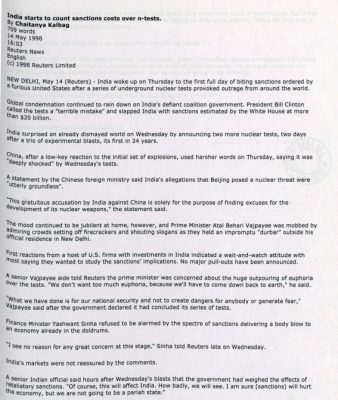India starts to count sanctions cost over n-tests
[Reuters]
Published date: 14th May 1998
14 May 1998
Reuters News
English
(c) 1998 Reuters Limited
NEW DELHI, May 14 (Reuters) – India woke up on Thursday to the first full day of biting sanctions ordered by a furious United States after a series of underground nuclear tests provoked outrage from around the world.
Global condemnation continued to rain down on India’s defiant coalition government. President Bill Clinton called the tests a “terrible mistake” and slapped India with sanctions estimated by the White House at more than $20 billion.
India surprised an already dismayed world on Wednesday by announcing two more nuclear tests, two days after a trio of experimental blasts, its first in 24 years.
China, after a low-key reaction to the initial set of explosions, used harsher words on Thursday, saying it was “deeply shocked” by Wednesday’s tests.
A statement by the Chinese foreign ministry said India’s allegations that Beijing posed a nuclear threat were “utterly groundless”. “This gratuitous accusation by India against China is solely for the purpose of finding excuses for the development of its nuclear weapons,” the statement said.
The mood continued to be jubilant at home, however, and Prime Minister Atal Behari Vajpayee was mobbed by admiring crowds setting off firecrackers and shouting slogans as they held an impromptu “durbar” outside his official residence in New Delhi.
First reactions from a host of U.S. firms with Investments in India indicated a wait-and-watch attitude with most saying they wanted to study the sanctions’ implications. No major pull-outs have been announced.
A senior Vajpayee aide told Reuters the prime minister was concerned about the huge outpouring of euphoria over the tests. “We don’t want too much euphoria, because we’ll have to come down back to earth,” he said.
“What we have done is for our national security and not to create dangers for anybody or generate fear,” Vajpayee said after the government declared it had concluded its series of tests.
Finance Minister Yashwant Sinha refused to be alarmed by the spectre of sanctions delivering a body blow to an economy already in the doldrums.
“I see no reason for any great concern at this stage,” Sinha told Reuters late on Wednesday.
India’s markets were not reassured by the comments.
A senior Indian official said hours after Wednesday’s blasts that the government had weighed the effects of retaliatory sanctions. “Of course, this will affect India. How badly, we will see. I am sure (sanctions) will hurt the economy, but we are not going to be a pariah state.”
New Delhi now had a “credible nuclear deterrent” and wanted to be treated as a nuclear weapons state in test ban negotiations that it would not join unconditionally.
The Indian rupee sank below the 40-to-a-dollar level and was quoted at 40.56/61 at 0755 GMT, well below its weekend close. Six-month forward premiums were at 11.14 percent compared to 6.80 percent last weekend.
But the Bombay Stock Exchange’s benchmark 30-share index rose on Thursday as speculators bought at low levels, ignoring news of the sanctions.
The index has fallen 4.7 percent, or 187.92 points, to 3,834.28 from last Friday’s close of 4,022.20. It dived 4.12 percent to 3,782.76 on Wednesday – its steepest point-drop in 14 months.
The Business Standard newspaper said the nuclear tests would give India more clout in negotiations, but if the major nations chose to make an example of New Delhi for daring to defy world opinion, “India will find that it has been guilty of a gross error of judgment.
“Then the question will once again be asked: Was it worth the candle?”
The Times of India noted that, apart from the United States, other nations had reacted symbolically by cutting off aid. “Apart from the fact that it is time India weaned itself off such handouts, the amounts involved are hardly going to cause sleeplessness in New Delhi,” the newspaper wrote In an editorial.
The newspaper said the reaction of foreign investors was more worrying, but investment decisions would depend more on India’s economic policies than on the diplomatic stand-off.






